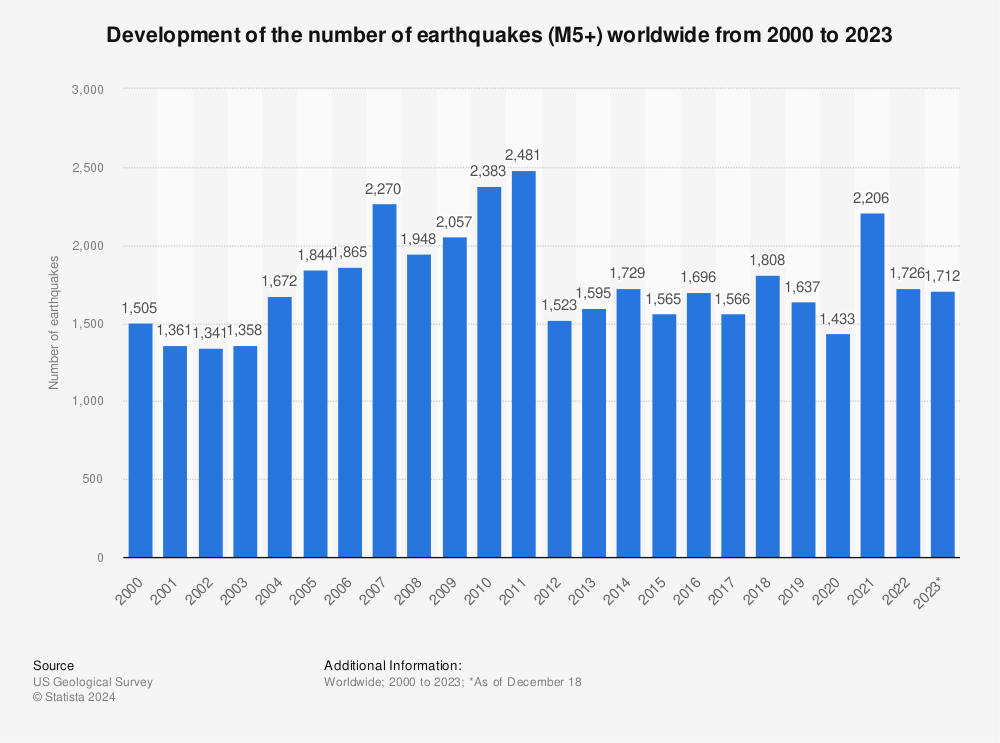The study and research of Earth Quakes
Grade 9
Presentation
Problem
How do earthquakes impact the ecosystem? Earthquakes can cause surface rupture, landslides, soil liquefaction, floods, tsunamis, etc. Soil liquefaction can ruin many habitats and cause many animal deaths. Soil liquefaction is where saturated soil temporarily loses there stiffness, making it seem more like a liquid than a solid. When an earthquake happens, the ground shakes so terribly that the soil particles start rearranging themselves, since the ground is shaking so much, it causes the soil to lose its stiffness and strength leading to soil liquefaction. Surface rupture occurs mostly when earthquakes occur. Surface rupture occurs when movement on a fault deep within the earth breaks through the surface. Surface faulting can ruin many habitats, not only on land but also underwater. Now when a surface rupture occurs underwater, that could cause tsunamis, which can destroy many ecosystems and human structures. Whenever a huge natural disaster happens, such as an earthquake, it can cause more natural disasters, impacting the ecosystem. Earthquakes can cause secondary effects such as tsunamis, floods, and forest fires, which can also harm/destroy an ecosystem. How do earthquakes affect underwater ecosystems? Earthquakes can ruin the flow of rivers, which can affect the animals living in the river, or affect the animals drinking from that river. Earthquakes can also destroy many organisms' habitats, destroying the ecosystem’s food chain, food web, and ecosystem.
How do we resolve this problem? We can start by restoring damaged ecosystems and habitats, and giving people an early warning if an earthquake Is about to occur. That way, people can evacuate and collect their personal belongings. By restoring habitats and ecosystems, we are fixing many living organism's homes, so that they can live once again. Not only does this benefit the organisms that live in that ecosystem, but it also benefits us because we need ecosystems to also survive, ( trees, water, fruits that grow on trees).
Method
I researched and studied many websites and links dedicated to earthquakes, and found a solution to how we can resolve earthquakes impacting the ecosystem.
Research
How do earthquakes occur? It’s important to know earthquakes can vary in size, magnitude, and intensity. Now, the earth has small tectonic plates that are located on top of a partially molten layer of rock called the asthenosphere. These plates are constantly and slowly moving, due to the heat-driven convection currents in the mantle below. Tectonic plates are made up of the crust and the upper mantle, which is broken into large plates of rock. Now tectonic plates are always slowly moving, but at times, platonic plates get stuck due to their sharp edges, and friction. When the stress on the edge becomes too much and overcomes friction, that’s when an earthquake occurs, and releases energy in huge waves that travel through the earth’s crust and cause the shaking that we can feel when an earthquake occurs.
What can we do to protect ourselves from earthquakes?
When an earthquake occurs, the first thing we should do is DCH.
1. Drop. Cover. Hold on. If there are any heavy objects such as tables, desks, or beds. It is suggested that you drop onto your hands and knees, then go under that heavy object and hold on to that object.
2. IF you are inside, you should stay inside. Do not run outside or into other rooms when you are indoors during an earthquake. When you are hiding, make sure that you are not beside the glass, hanging objects, bookcases, china cabinets, or other large furniture that could fall. Watch for falling objects while hiding, such as bricks from fireplaces and chimneys, light fixtures, wall hangings, high shelves, and cabinets with doors that could swing open. If you are in the kitchen, make sure the stove is off.
3. If you are in a high-rise building, repeat the DCH. Drop. Cover. Hold on.
It is important to move away from windows and outside walls. Must stay inside, and do NOT use elevators since the electricity may go out.
4. If you are outside, stay outside. Stay away from buildings, gas lines, utility wires, and sinkholes. Go to an open area with no trees, no buildings, and no houses, and get down low until the shaking stops.
5. If you are in a moving vehicle, stop as quickly and safely as possible. Move your car away from buildings, utility wires, and telephone poles. It is best to stay in the car and set the parking brake. Turn on the radio for any information about the earthquake.
6. If you cannot drop to the ground, stay seated.
These important tips will help you during an earthquake since safety is the #1 priority.
What are the positive and negative effects of earthquakes? Earthquakes are one of the most dangerous natural disasters. Earthquakes destroy human infrastructures, cause many deaths and injuries, and make people lose loved ones. Earthquakes are horrible and affect many people's lives. People lose their jobs because of earthquakes, people lose their homes because of earthquakes, and people lose their loved ones because of earthquakes. Earthquakes usually come off as a negative concept, but there are positive effects of earthquakes. The positive effects of earthquakes are that they provide many natural service functions, like influencing the flow of underground water, oil and natural gas, making mineral resources available, and landform development. All the positive effects earthquakes have are a benefit to humans in many ways.
How do earthquakes impact the ecosystem? Earthquakes can cause surface rupture, landslides, soil liquefaction, floods, tsunamis, etc. Soil liquefaction can ruin many habitats and cause many animal deaths. Soil liquefaction is where saturated soil temporarily loses there stiffness, making it seem more like a liquid than a solid. When an earthquake happens, the ground shakes so terribly that the soil particles start rearranging themselves, since the ground is shaking so much, it causes the soil to lose its stiffness and strength leading to soil liquefaction. Surface rupture occurs mostly when earthquakes occur. Surface rupture occurs when movement on a fault deep within the earth breaks through the surface. Surface faulting can ruin many habitats, not only on land but also underwater. Now when a surface rupture occurs underwater, that could cause tsunamis, which can destroy many ecosystems and human structures. Whenever a huge natural disaster happens, such as an earthquake, it can cause more natural disasters, impacting the ecosystem. Earthquakes can cause secondary effects such as tsunamis, floods, and forest fires, which can also harm/destroy an ecosystem. How do earthquakes affect underwater ecosystems? Earthquakes can ruin the flow of rivers, which can affect the animals living in the river, or affect the animals drinking from that river. Earthquakes can also destroy many organisms' habitats, destroying the ecosystem’s food chain, food web, and ecosystem.
How do earthquakes end up creating tsunamis? If the tectonic plates are close to the ocean floor, the energy that earthquakes release in huge waves causes the ocean floor to suddenly rise or lift. When the ocean floor rises, it causes the ocean water to also rise, so when the ocean water rises, it can cause a tsunami. When tsunamis approach land, the tsunami wipes out everything. Cars, people, houses, etc. It removes everything without proper balance.
Does the earth need earthquakes? Yes, because if there are no earthquakes, and no platonic plates moving, then the mountains would wear down since there is no platonic activity to uplift them. Then over time, the earth would just become flatter and boring. Earthquakes are essential to maintain stable climate conditions on Earth. Humans go and explore places with nice views such as mountains, waterfalls, etc.
What is the average amount of earthquakes that take place in a year?
Researchers say that there are about 20,000 earthquakes per year, approximately 55 per day. Since the 1900s, researchers have expected 16 major earthquakes in any year. The year with the most major earthquakes was 2010, with approximately 23 major earthquakes. There are usually 16 major earthquakes in a year, with a magnitude of 7-8.0 range. There are up to 12,000-14,000 small earthquakes each year with a magnitude of 2.5 or less.
How are earthquakes measured? There are many different ways to measure earthquakes, but the most common measurements that scientists use are, the Richter scale, moment magnitude scale, and seismographs. The Richter scale was developed in 1935 by Charles F. Richter. Charles F. Richter developed this scale to measure the amplitude of seismic waves, ( which can be recorded by seismographs). The Richter scale does not measure earthquakes with a magnitude above 7.0. Now a moment magnitude scale is a scale that measures an accurate description of the earthquake, (how big it is, the amount of energy released, etc.) Seismographs are like instruments. They can detect seismic waves that are usually generated by earthquakes. They detect the seismic waves using a seismometer which measures the ground motion.
What are the magnitude measures of earthquakes?
What were the most historical earthquakes recorded in history?
1. Valdivia, Chile- 1960 magnitude 9.5
2. Alaska, USA- 1964 magnitude 9.2
3. Sumatra, Indonesia- 2004 magnitude 9.2
4. Tohoku, Japan- 2011 magnitude 9.1
5. Kamchatka, Russia-1952 magnitude 9.0
Data
Earthquake graph from 2000-2023

This data represents the number of earthquakes over the years. So as you can see, the year 2010, and 2011 had a huge amount of earthquakes. The resulting amount in 2010 was 2.38, and in 2011 was 2,841. After 2011, the number of earthquakes decreased, but then gradually increased in 2021. The resulting amount of earthquakes in 2021 was 2,206.
The magnitude of earthquakes.
Conclusion
In conclusion, earthquakes are horrible and terrifying natural disasters. It is important to know about earthquakes and how it occurs. Earthquakes always come off as a negative impact on the Earth’s surface and the communities living nearby. Still, they can also have a positive effect on maintaining the Earth’s crust’s unique structure. While we cannot prevent earthquakes, we can surely try to be safe from them and protect infrastructures, the environment, and ourselves. Earthquake monitoring systems and volcano observatories provide valuable data to assess and mitigate risks associated with these events. We should always remember that when a major earthquake happens in an area, city, or country, it is important to help the people in need after an earthquake.
Earthquakes can destroy ecosystems; we humans should do everything to stop that from happening. Even though earthquakes only last a few moments, they can surely cause unimaginable damage to the earth. Therefore, while earthquakes are an uncontrollable natural phenomenon, scientific knowledge and preparedness can assist in minimizing the potential harm they cause. This highlights the importance of continued research, monitoring, and disaster preparedness to protect vulnerable communities and reduce the impact of these natural disasters.
Citations
How do earthquakes occur?
https://www.usgs.gov/faqs/what-earthquake-and-what-causes-them-happen#:~:text=The%20tectonic%20plates%20are%20always,the%20shaking%20that%20we%20feel.
What can we do to protect ourselves from an earthquake?
https://www.cdc.gov/disasters/earthquakes/during.html#:~:text=If%20you%20are%20able%2C%20seek,up%20with%20blankets%20and%20pillows.
What are the positive and negative effects of earthquakes?
https://www.yonature.com/effects-earthquakes-positive-negative-impacts-with-examples/#:~:text=Without%20a%20doubt%2C%20earthquakes%20cause,ground%20by%20shuffling%20rock%20layers.
How do earthquakes impact the ecosystem?
https://jamoroki.com/earthquakes-impact-on-the-environment/#:~:text=In%20addition%20to%20the%20damage,impact%20animal%20and%20plant%20populations.
How do earthquakes end up creating tsunamis?
https://www.noaa.gov/jetstream/tsunamis/tsunami-generation-earthquakes#:~:text=If%20big%20enough%20and%20close,sets%20a%20tsunami%20in%20motion.
Does the earth need earthquakes?
https://www.caltech.edu/about/news/caltech-question-week-what-would-be-effect-if-all-plate-tectonics-movement-stopped-forever-188#:~:text=Erosion%20would%20continue%20to%20wear,to%20go%20trekking%20in%20Nepal.
What were the most historical earthquakes recorded in history?
https://earthobservatory.sg/earth-science-education/earth-science-faqs/geology-and-tectonics/what-are-the-biggest-historical-earthquakes#:~:text=Older%20earthquakes'%20magnitudes%20are%20therefore,under%20the%20South%20American%20plate.
Acknowledgement
I want to thank my parents and my teachers for their help in this science fair project, without them, I wouldn't have been able to create such an awesome project!

